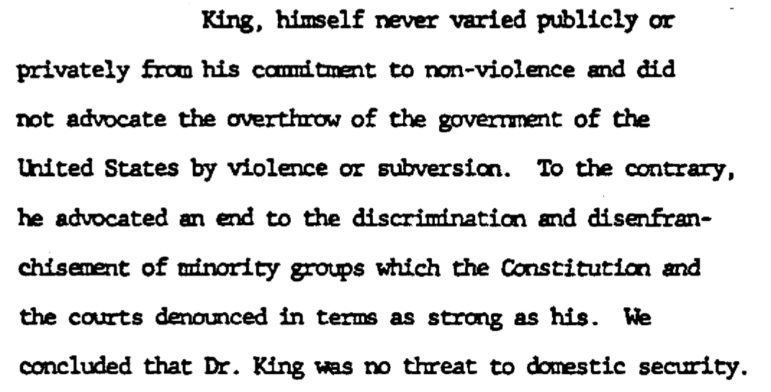
FBI
A key conclusion from the 1977 report.
There are many worthy ways to observe Martin Luther King, Jr. Day—most of them involving watching, hearing or reading the slain civil rights leader’s speeches, which not only maintain their oratorical brilliance nearly five decades after his death, but often bear messages uncannily apropos to the current moment.
The words of nameless federal bureaucrats can hardly compete against those speeches for eloquence or moral clarity. But the 1977 FBI report critiquing the bureau’s investigation into King’s assassination, and the six-year “security” investigation that preceded it, establishes with remarkable clarity the immense challenges King faced thanks to the deeply personal suspicions and resentments harbored by J. Edgar Hoover and other top officials.
The security investigation was predicated on the suspicion that the Communist Party had infiltrated the civil rights movement, embodied by two King advisors whom the FBI had tabbed as “ranking members” of the CP. Given the paranoia of the era, that pretext might have justified a brief look at where King’s sympathies lay.
But the bureau’s surveillance—some of which occurred in New York, on the initiative of the local FBI office—quickly went beyond running down those leads, eventually becoming an “illegal counterintelligence program directed to discredit and neutralize the civil rights leader.” It included promoting alternative civil rights leaders while King was alive and, after his deaht, efforts to stave off the creation of an MLK Day by briefing members of Congress “on King’s background” and trying to discredit Coretta Scott King and some of MLK’s associates.
The report, which is in two parts, lives on the FBI’s website. The first part largely concerns the probe into the April 1968 assassination. In today’s political environment, this section of the report offers an instructive snapshot of King as a tactician — his negotiations with youthful and more radical organizers, the efforts by opponents to link a tiny minority of violent protesters to his larger movement, the frustration over the shortcomings of the poor people’s campaign.
The second section delves into the origins of the bureau’s campaign against King. It’s interesting to wonder, after recent controversies over the phrase “Black Lives Matter” or the sight of NFL players kneeling during the National Anthem, whether the backlash to those demonstrations is purely spontaneous.









9 thoughts on “Read the FBI Report on Its Spying Campaign Against MLK”
MLK was an amazing man. I wish many leaders, regardless of race, followed his teachings. His goal was only, a fair opportunity regardless of race.
His insight was timeless and could and should be applied today.
I can not believe we are discussing this again(still)
Long live Dr. King’s msg.
Right on!
right arm(fist)
The FBI has been a dangerous political tool from the beginning. Lyndon Johnson used it against MLK and J. E Hoover used it as best he could to take power from Presidents. There are only three branches of government where does the FBI fit In? IMHOP it needs to go.
David
Pingback: St. Vincent & Grenadines News
Pingback: On King Day, Trump Talked about as A lot as Civil Rights Chief - Berita Menarik Terbaru
Pingback: On King Day, Trump Mentioned as Much as Civil Rights Leader | Upfrontpost
Pingback: Two of Martin Luther King Jr.'s Children Speak Out Against Trump | Viral News Everyday
Wow, I expected a piece bashing the FBI and our government. Evidently, in 1977 they came to the correct conclusion of the power of Dr. King’s words — Non-Violence, an end to the discrimination [that was prevalent in the 1950’s] and respect for our Consitution.
The pseudo-Activists of today ought to read the report to see how hollow their words.